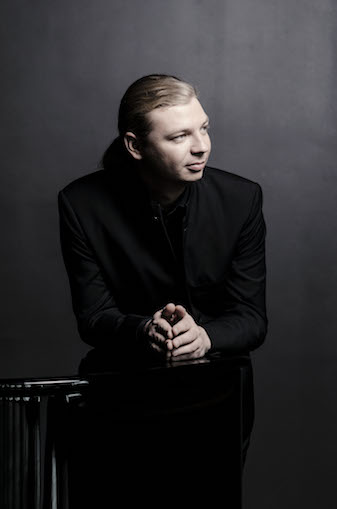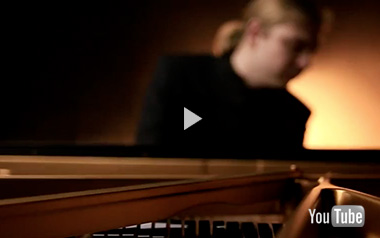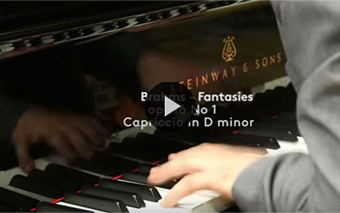Next Concerts
February 19, 2026
Odense
Odense C, Denmark
Ravel: Piano Concerto in G major, M.83
– Pierre Bleuse (conductor)
Venue: Odense Concert Hall, Odense
Mar 7, 2026
Netherlands Philharmonic / European Tour
Amsterdam, Netherlands
Brahms: Piano Concerto No.2 in B-flat major, Op.83
– Lorenzo Viotti (conductor)
Venue: The Concertgebouw, Amsterdam
Reviews
November 21st, 2017
Amsterdam Concertgebouw Recital
“For the extremely talented Russian pianist Dennis Kozhukhin (1986), born and raised in a musical family in Nizhni Novgorod, the ongoing strive for the highest possible quality is a natural goal, hard work is the way to reach that goal and success is nothing more than a pleasant addition.
After Kozhukhin, who now played for the Third time in the master pianists series, won the Queen Elisabeth Competition in 2010, he instantly became an international star without starlike airs. This Prize made it possible for him to worldwide do what he loves to do most: doing justice to the composer who’s music he is playing and searching for the “ideal balance between the emotional and the intellectual”. That this balance can be different for every musician within the same piece, is for Kozhukhin “the beauty of classical music”.
Musicality seems for Kozhukhin a natural gift, but apart from that, he is also a sharp analyst of the works he plays, and a very gifted instrumentalist. During his study at the Balakirev School of Music and later on at the Escuela Superior de Música Reina Sofia, where he was taught by, amongst others, Dmitri Bashkirov, he must have studied so hard that he has mastered the “craft” of piano playing completely. On stage, Kozhukhin seems to coincide with the music and the piano, without an ego and without placing himself in the spotlight.
But it’s really not the case that Kozhukhin has nothing to say, because it is due to his empathy, intelligence and imagination, that this pianist seems to have the secret key that provides him access to the specific, inner richness of a score. Kozhukhin opens the gate and takes his audience with him on a fascinating musically expedition, in which time doesn’t matter, sounds become monumental architectures, style features organically shape to the rhythm and dynamics of the notes, emotions manifest themselves in a rainbow of delicate colour shades, every detail of the articulation gets clear contours, melodic lines flow like rivers and light and dark shades glide over one and other like leaves in the wind.
Inwardly Kozhukhin seems very sure of his mastering the musical matter, and he easily seem to conquer every obstacle that could work in the disadvantage of the composer he performs. He doesn’t speed up when being nervous, doesn’t show empty (meaningless) virtuosity and doesn’t scream over-emotional or hysterical what can be said in clear no-nonsense language.
For each composer, he creates its own universe, in which integrity and nobleness rule, creating a nice world to be in.
Kozhukhins striking interpretation of Händels Suite no. 7 in g, evoked the image of a abundant palace garden from the 18th century, that has lovely singing birds hidden in the rosebushes and in which a royal company is strolling through the garden looking at the rosebuds and blossoms, smelling the fresh Spring air.
A completely different mood was evoked with Kozhukhin’s dreamingly and melancholic interpretations of the 3 Intermezzi op. 117 by Brahms, in which everything evolved around contemplation, fall-like images and the sadness of old age.
This was followed by a hallucinating interpretation of Bartok’s rarely played Out of Doors, Sz. 81, in which burlesque dances with wild and biting rhythms was alternated with fascinating vague panorama’s in the cosmos. Kozhukhins unique colour pallet that he used for Bartok was so hypnotizing, that it sometimes seemed as if he could really reveal other dimensions present in the Concertgebouw.
Also Debussy had it’s own special sound. His 12 Préludes from Book 1 went by, like under water panorama’s, seen through a symbolic boat made of glass, pushed forward by the wind and floating on the movements of the water. That caused a dreamingly game of reflection played by the light reflecting the water surface and the breaking of this surface by shadows coming from the deep, sometimes turning out to be a silver coloured group of fishes, sometimes scary monsters, all moving under the water surface.
Kozhukhin ended his varied solo recital with a refined interpretation of Gershwins Rhapsody in Blue, which had a jazzy tempo and articulation, a sensual sound but foremost was a captivating experience due to the pleasure with which Kozhukhin played Gershwin’s ‘blue’ notes. After that he played 2 beautiful encores by Rachmaninoff and Grieg.” – meesterpianisten.nl


